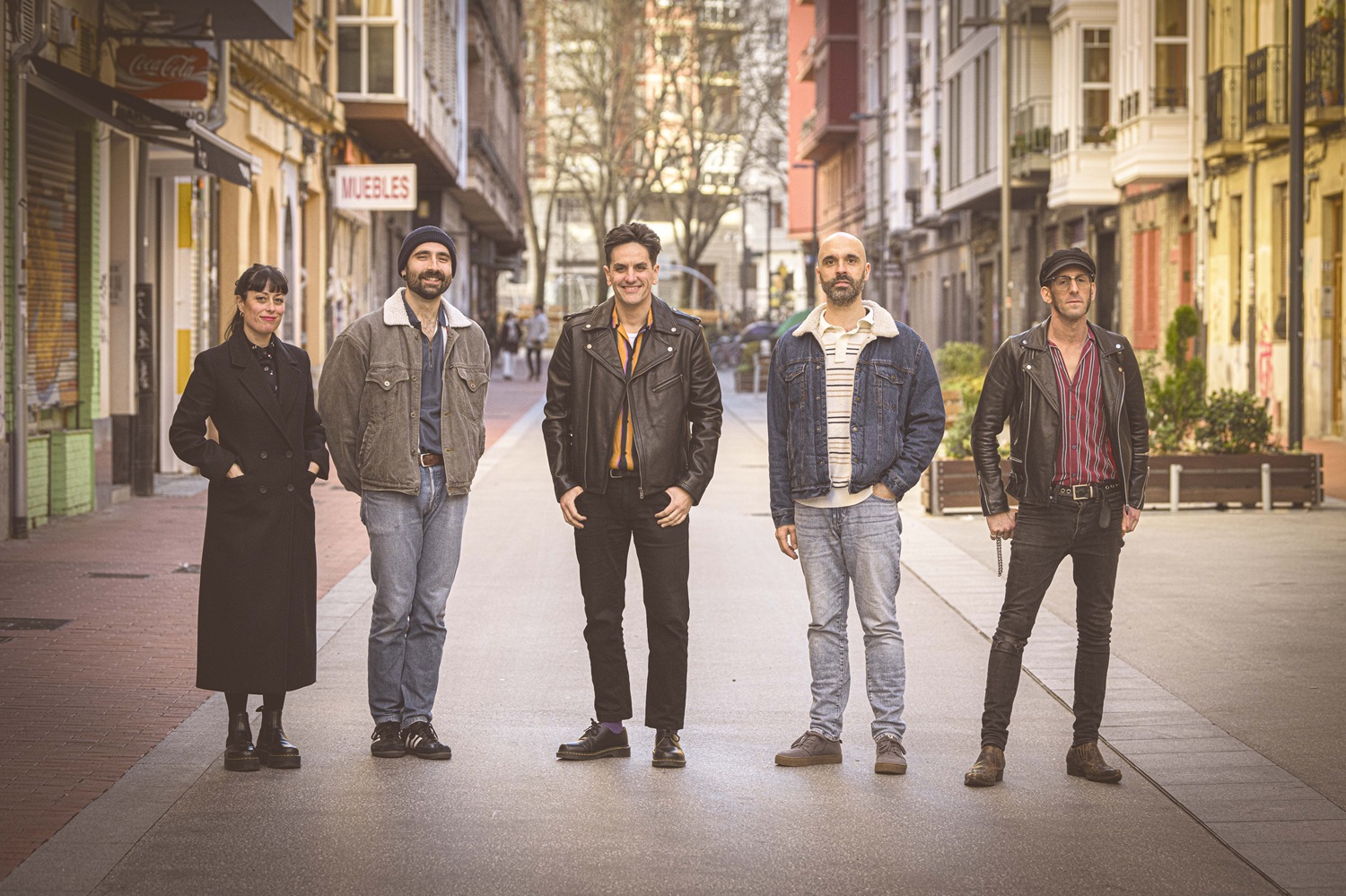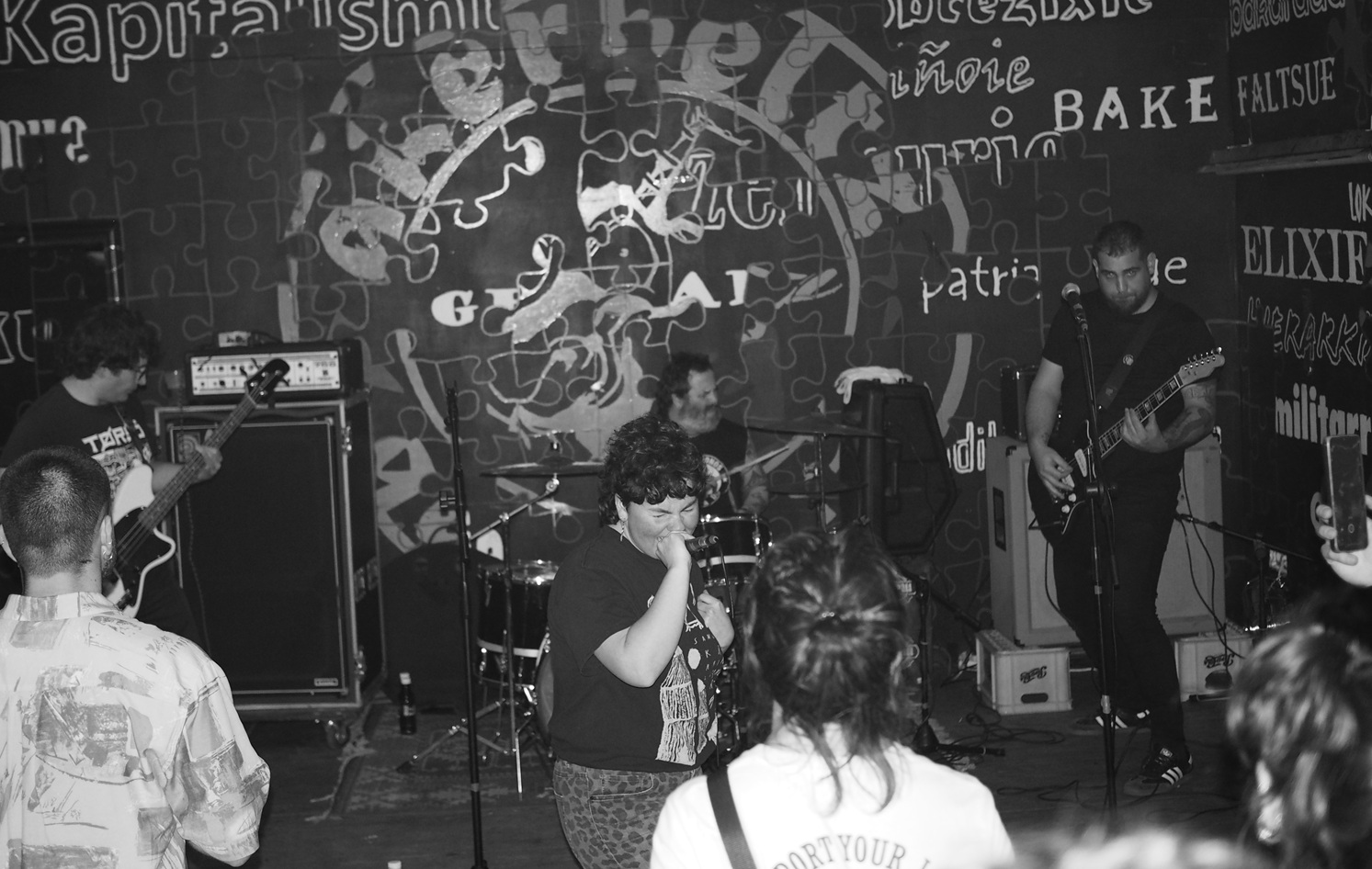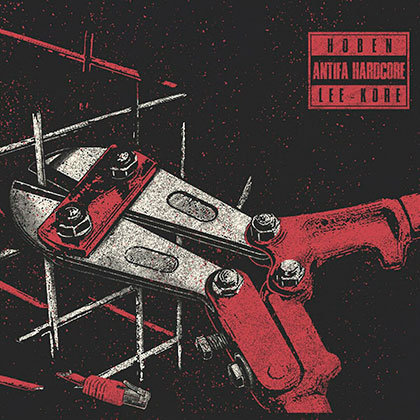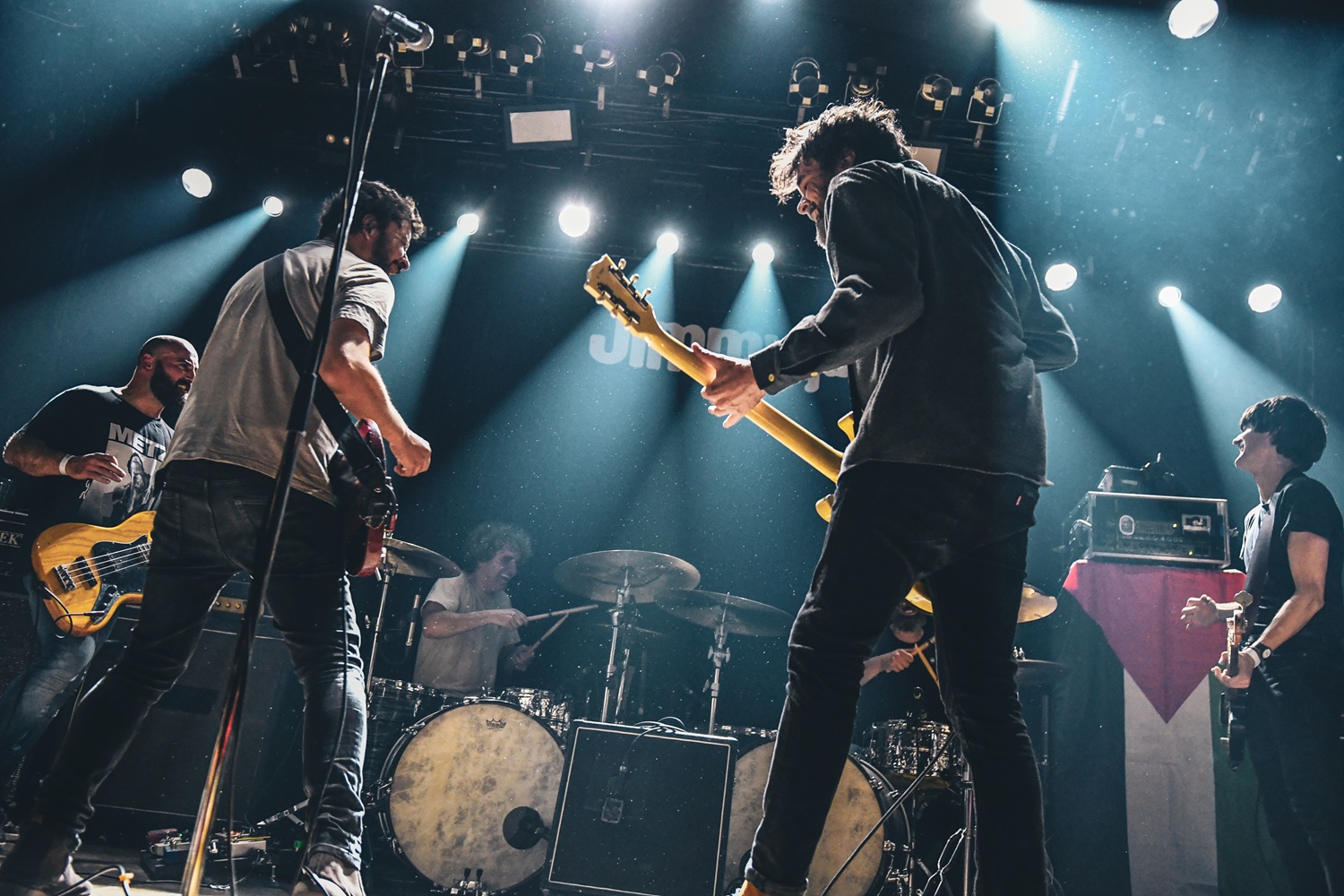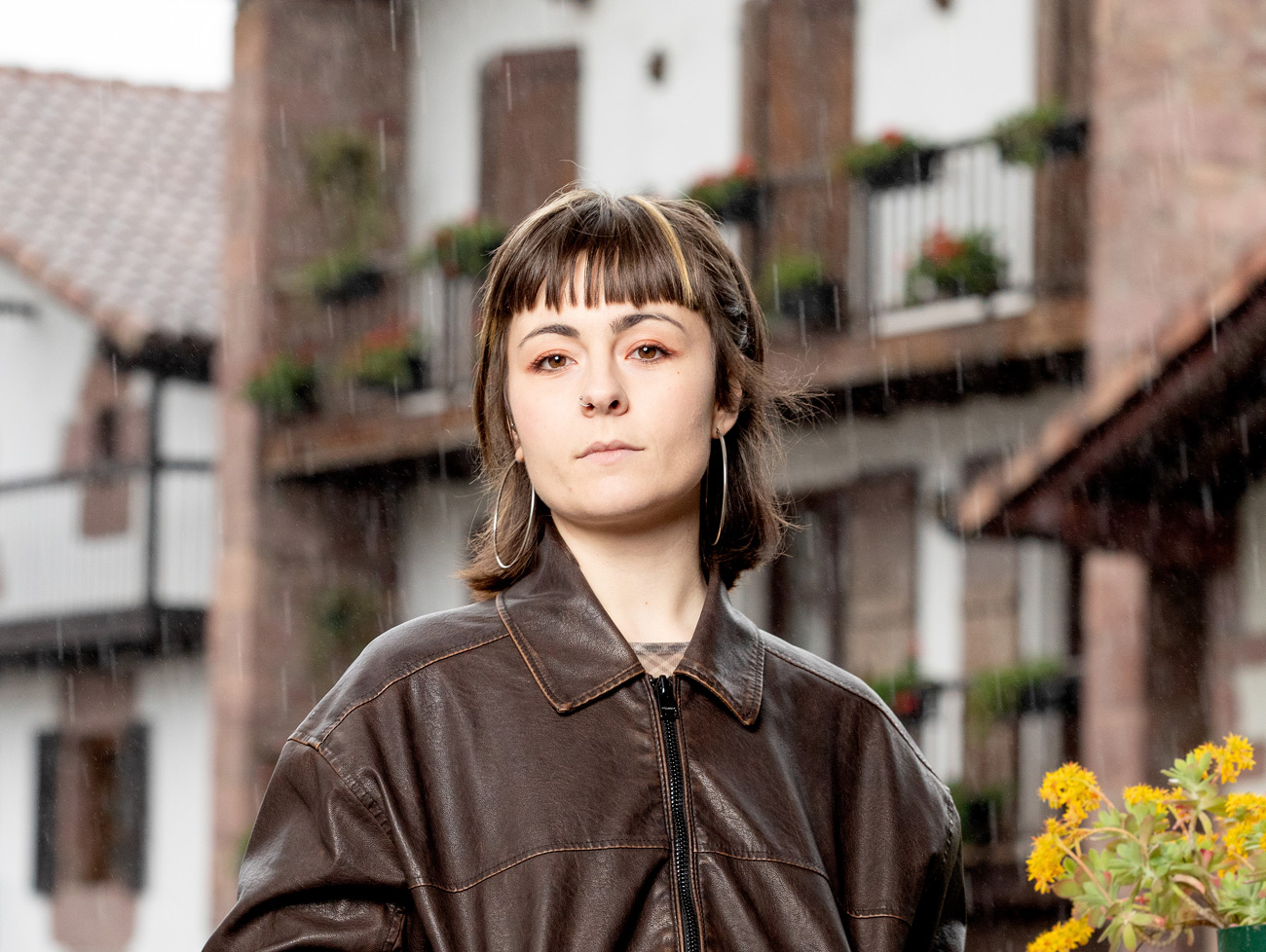"Every voice is exclusive to itself and very real."
- Peru Galley (1987, Usurbil) has come to Usurbil using special Christmas permits. We've met at your childhood home, where you've recorded Nor zara zu? part of the disco-book. Visual and experimental artist able to say a lot without making a lot of noise. This wonderful work we published in 2020 with Mukuru Kolektiboa has not been the trending of radios and social media. Self-management doesn't have much echo, we know. In any case, the one from Usurbil has published one of the best Basque albums of the year of the pandemic: soft, playful, bright and serene melodies, with pungent and thoughtful letters. Dose of beauty to face the year of isolation and dependency. To help us reflect on who we are.

Last year you published a record capable of dealing with lockdown. What's that like?
When I came back from Bolivia more than three years ago, I started thinking about the record. I'm always recording and saving ideas for songs, I like to give you time to know how much they change. Before the lockdown, I had already recorded some songs on this descent from my parents, and at the end of the lockdown, I decided to say goodbye. It took me enthusiastically, and thanks to it I made sense [Galley “stole” the conversation about the pandemic of the sixth song on the album, taking advantage of the work to locate it in the cursed 2020].
It's a disco-book in which you see a lot of drawings that you can see in Peru. In a moment, he moves from the question mark to the wonder sign: Who are you! Is it a need to claim?
It is true that, even if you use metaphors and make useful reflections for everyone, songs always have their autobiographical, I mean my experience. In this case the title has come next, giving unity to the songs developed over time. In any case, the momentous question that we all ask or should ask is “who are you?” and the answer is changing.
It confuses deep themes with routines in words, for example with the things of people who go “occasionally to the solarium”.
I have a kind of dark side, and I usually address it. On this occasion, I have tried to get away from it, especially with music, giving it another life.
I think it's a joyful record.
In my opinion, too, but I think it's because I've tried. I've made an effort to make it joyful.
We tend to connect joy to music from nightclubs. Bombs, rhythmic bass, etc. But in this case, it's used a very subtle instrumentation, like the charanga. A kind of serene joy.
Yes, I've tried to find that balance to give light. Because if you just take the words, the work has another tone. With the choice of instruments, I have tried to seek that calm and that radiance.
In addition to the music, in the book you have included short drawings and poems.
To me, making a record is an excuse to give way to everything I have, and I came up with it. A couple of years ago, I started making drawings, and then I had them. Today you hear a lot digitally, and when it comes to buying I at least thank you for something else, not a plastic CD and you're ready. I wanted to give it importance, and I've personally designed the book.
However, drawings and letters are open, they make the sense that you want to give them, and that's the most important thing.
It is a work that, in any case, has integrity.
Yes, it is true that even though they were loose pieces, I've been sewing later; I think I've taken a lot of work. It might be easier to do it on Single, but I really liked this work.
What is the point of this whole thing for you?
My intention is to be happy with my work. This all gives me confidence. I don't think about what's going to last or what's going to come, because once I get fired, I get into something else. The artist should like what he does.
"It's very important for me to change within the music. That's something against the market, because you tend to repeat what you like."
But the artist is also looking for something else.
Yes, but first about yourself. I live music as a way to escape many things that I don't like in this society. To leave or to create other things. And then there's a lot of criticism, a lot of self-criticism. I myself live and I make music from a personal need, then you leave your melodies, your metaphors, and if they are of great use to another. I wouldn't say that music can change the world, but it does change itself, and it starts with it.
You've done this work alone, but you're not alone. You've fired her with your friends from Mukuru.Sometimes music can
be very lonely, but it doesn't have to be that way. We live quite alone, and that's why it arises from friendly relationships. It's increasingly important to make music with friends. You make more sense of what you do, if someone is doing something next to you.
When you're singing with Hathe, you say, "Only your voice comes out." Voice improvisation is another way you're working.
For me, it's very important to change within music. That's something against the market, because you tend to repeat what you like. The field of experimentation gives me a lot, and I need it. I started with voice experiments when I met Idoia Hatxe, putting the instrument aside. The voice is very primitive, the one we have since we're young and the one we don't work very hard, if it's not to speak. I get a lot of questions and I want to go deeper. The phonetics of a language, singing without concrete words, that wide range of music and sound – from a scream to a soft note –… that is what we are working on among some of Uharte’s friends.
The voice can give infinite notes within a scale to open new universes.
Music is opening some endless doors. Before I realized you're in another room and then in the other room -- I guess I started coming up through the song. I would sing like everyone, as a little boy, and then, like everyone else, I stopped singing or drawing. Then I had to replenish it. And singing is very useful for people. There are singing therapies and a lot of things...
I'm increasingly focused on the voice, and I think it's beneficial for everyone. We're used to doing all the concerts in the same way, and that makes me tired: all the same songs, the same duration -- as a public, too, I'm grateful for a lot of risk, like it or not. After all, what art poses has not liked or not – I have lived through it this way – but has been mobilised.
Music and singing are an enriching resource to limit it to a song... As your songs are quite naked, more nuances of voice are appreciated.
After all, each voice is only of oneself and is very real. With the instruments it is harder to say what you mean... But I still have a lot to think about. In Huarte, in the experimental group, we've been gathering people from different backgrounds to explore different techniques and artists, but we haven't come to anything specific.
.jpg)
Returning to the book, Artze’s influence is evident in your work.
Yes, there must be. I loved reading his books. I thought, “Here she lives next door and in Kalejar,” and one day I went home to meet her. I looked for an excuse and said I wanted to make a documentary about him. I later proposed three or four times, but she told me no. I understood that he did not want to be known, but to make his work known. You can say that I drink from what I hear and read, and I've read a lot of Artze, he'll go out there.
On the occasion of the proposal by Loraldia de Txakur Gorria, we made the show H-Artzetik [on the 24th they will perform the show in Oihaneder de Vitoria], and there we also got to work there.
You're also a filmmaker. Did you do a job with water-damaged slides?
There was a flood in the neighborhood, when I was a kid, that destroyed everything. Her parents' slide box also got ugly. After years, when I found that box, I became curious. They were very transformed, and I started scanning one by one, about 2,000 photos. So I saw two possible projects: the most abstract slide and the one that still kept the images. With the most abstract, I made a documentary that was presented at the Punto de Vista festival. I would mix the interviews with the neighbors and those curious images. With the others, I did a job called Uraren Oldea, where I merged color slides and music.
Female musicians, being female musicians, are always asked about the parity of the scene. And men don't, like we don't have a responsibility. When you do your work, we have seen you in other roles, in collaboration with women.
Yes, I think it is very important to reflect on the subject, but also to make visible what we are doing. There you see the problems that arise in coexistence, in everyday life. A lot of work is being done among women on this issue, such as the “We Were Together” days, where many interesting musicians are coming to light.
But let's see, I'm talking in an interview about that, and I go up to a stage to sing. I am already talking about a position of power. I sometimes wonder what I do, if I should take that place. In any case, when it comes to tackling the issue, we must be with women, supporting and supporting their projects where necessary.
There are also different ways to fill the plaza.
We have to be aware that when we go up on a stage, we're setting an example. Be four cats or a hundred people in front of you, they look at you. Men should be aware of the behaviors that we have on the table. It is said that it depends on style, but I think it is related to personality and that each one has to work, develop other models.
Above and below the table.
Yes, of course. After all, we have to know how to be behind, although sometimes it costs. And when women take the direction of the projects, they step aside, they push themselves and they lean on.
Transparent Beings
When: April 20th.
In which: In the Plaza of the Castle of Pamplona.
-----------------------------------------------
The concert is only half an hour away in the Plaza del Castillo de Pamplona; but it is still half empty, because it is raining. Whether... [+]
Obduction of Amenaza / Zirt Zart (Split-ep)
2024
---------------------------------------------------
The musical panorama is gigantic, impassable. Among them there are a few large groups that absorb all the foci; many others that are dedicated to the pursuit of it, and... [+]
Aposapo + Mäte + Daño Dolor
When: April 5th.
In which: In the Youth Center of Markina-Xemein.
---------------------------------------------------------
I’ve made my way to the cheese house with the shopping cart full of vegetables, and we’ve spent the evening cutting... [+]
Poliorkêtês
Kerobia
Autoekoiztua, 2025
--------------------------------------------------------
Azken aldian, lerrootan asko nabil hausnartzen musikak izan beharko lukeen “misio historikoaz” eta abarrez. Eta, nolabait, zer egin beharko lukeen... [+]
On March 7, the 150th anniversary of the birth of Maurice Ravel, the best Basque composer of all time. And in LA LUZ a tribute was paid to this composer, recalling the influence of the famous Bolero on the collective imagination.
By chance, Deutsche Grammophon has just released... [+]
Olatz Salvador
Noiz: martxoaren 15ean.
Non: Deustuko jaietan.
------------------------------------------------
Martxoak beti du deustuarrontzat kolore berezia; urtero ospatzen ditugu jaiak, San Jose egunaren bueltan. Bi asteburu bete festa, eta urtetik urtera Deustuko... [+]
Antifa hardcore
Lee-Kore + Hoben
Autoekoizpena
---------------------------------------------------------
Tamalez ez da ohikoa Arrasaten hardcore kontzertuak egitea, bestelako musika eszenak nagusitzen direlako. Hala bada, joan den larunbatean herriko gazte batzuen... [+]
Hunkituta eta ilusioz egin dut Iruñetik Oronozerako bidea. Maite dut Olaia entzutea, baita hizketan ere. Herriko farmaziaren ondoan autoa utzi eta balkoitik agurtu naute hark eta bere zakur Arak. Grabagailua martxan jarri aurretik, bueltaxka egin dugu frontoira eta Arak... [+]
Bizitza eztia
Verde Prato
Plan B Records, 2024
--------------------------------------------------------------
Ousmane Sembène zinemagile senegaldar ospetsuari galdetu zioten ea bere pelikulak Europan ulertzen ote ziren. Erantzuna, epikoa: “Izan gaitezen... [+]












